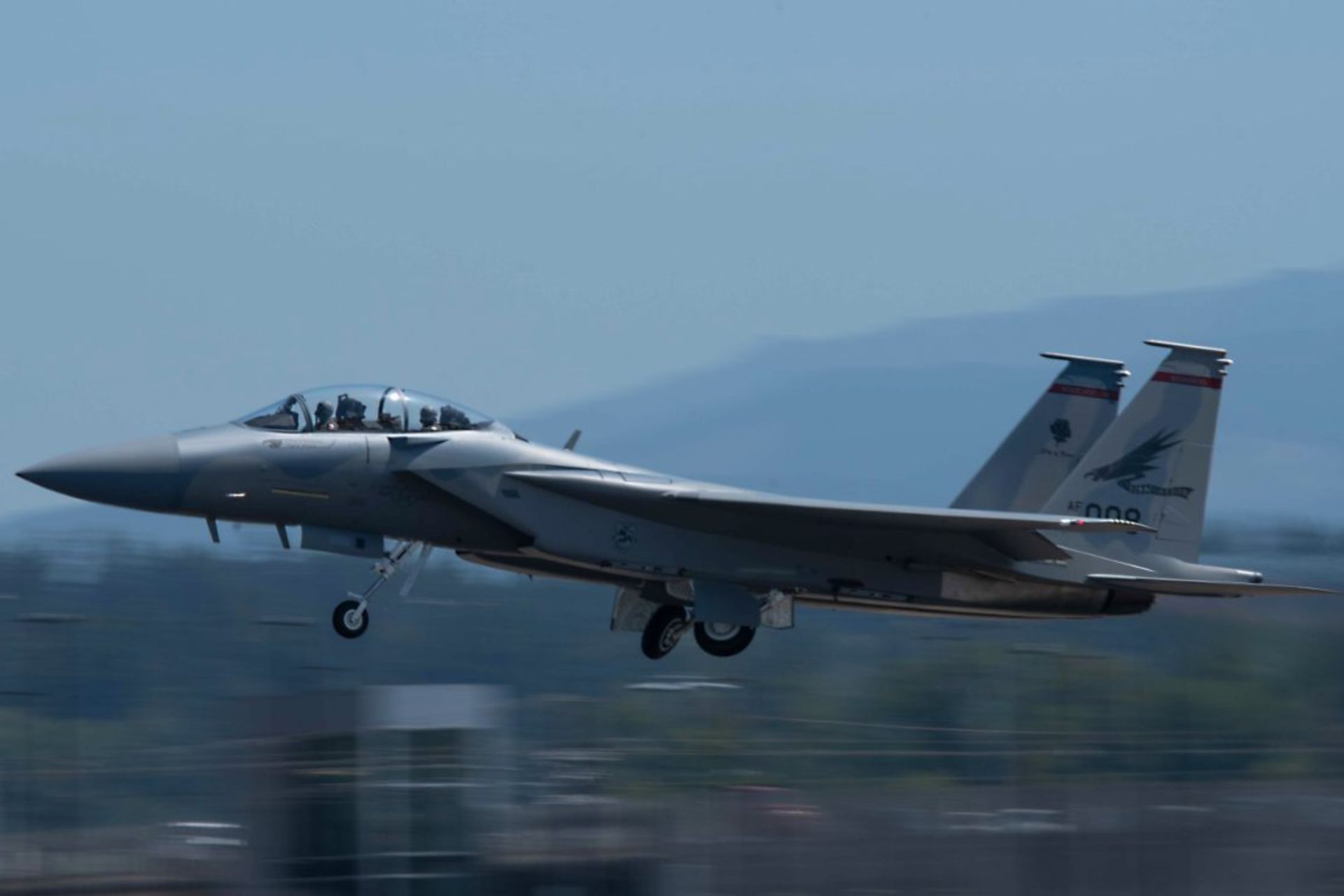U.S State Department approves sale of new upgraded F-15s to Israel but that’s not all

{loadposition bannertop}
{loadposition sidebarpub}
According to a statement from the U.S. State Department dated August 13, 2024, the United States has approved a sale to Israel worth $18 billion for up to 50 new F-15 fighter jets and upgrades for 25 existing F-15I models, including engines, radars, and other equipment. The deal requires Congressional approval and involves the delivery of F-15IA aircraft, similar to the F-15EX Eagle II used by the U.S. Air Force, which is the most advanced version of the F-15. Reports suggest that Israel would purchase 25 of these fighters, with an option for 25 more.Follow Army Recognition on Google News at this link
A 142nd Wing F-15EX Eagle II, tail 008, takes off from Portland Air National Guard Base, Ore. on July 12, 2024 (Picture source: U.S. Air National Guard)
Additionally, Israel is seeking “mid-life upgrade modification kits” for its F-15I aircraft, creating an F-15I+ program. Israel would also acquire 120 F110-GE-129 engines, 75 APG-82(V)1 active electronically scanned array radars, and other equipment, for a total estimated value of $18.82 billion.
The integration of the F-15IA into the Israeli Air Force’s fighter fleet will enhance Israel’s interoperability with U.S. systems and strengthen Israel’s aerial capabilities to address current and future threats, bolster its national defense, and serve as a deterrent against regional threats, according to the State Department’s Defense Security Cooperation Agency in a statement.
Israel has been considering a variant of the F-15EX since 2018, although the official request to the United States did not arrive until 2023. The Israeli Air Force also intends to purchase more F-35I jets, its variant of the F-35. In addition to the F-15s, the State Department has also approved the sale of up to 30 Advanced Medium-Range Air-to-Air Missiles (AMRAAM) to Israel, at a cost of $102.5 million.
The AMRAAMs are a critical air combat capability used to defend against aerial threats, such as the missile and drone salvo launched against Israel on April 14, according to the State Department’s statement. The proposed sale will enhance Israel’s ability to address current and future enemy threats, strengthen its territorial defense, and serve as a deterrent against regional threats.
During the April attack, Iran launched more than 100 ballistic missiles, 30 land-attack cruise missiles, and 150 drones against Israel. Israel’s ground-based missile defense systems, F-15s, and F-35s all contributed to intercepting some of these threats, and the United States and other allies also intervened, with American F-15Es and F-16s reportedly shooting down around 70 Iranian drones.
The State Department’s approval of these sales comes as Israel and its allies anticipate a potential new attack from Iran in retaliation for the assassination of Hamas leader Ismail Haniyeh. The White House has warned that a wave of missiles and drones could occur as early as this week, stating that it is preparing for a significant attack.
According to the U.S. statement, the proposed sale of this equipment and support will not alter the fundamental military balance in the region, which can be interpreted as suggesting that the modernization of Israel’s combat aircraft is a response to the modernization of the military capabilities of Israel’s “enemies” in the region, particularly Iran, as well as the increasing capabilities of armed militias in the area, representing a rise in new threats to Israel.
Israeli F-35 during pre-flight check and refueling (Picture source: Israel Air Force)

{loadposition bannertop}
{loadposition sidebarpub}
According to a statement from the U.S. State Department dated August 13, 2024, the United States has approved a sale to Israel worth $18 billion for up to 50 new F-15 fighter jets and upgrades for 25 existing F-15I models, including engines, radars, and other equipment. The deal requires Congressional approval and involves the delivery of F-15IA aircraft, similar to the F-15EX Eagle II used by the U.S. Air Force, which is the most advanced version of the F-15. Reports suggest that Israel would purchase 25 of these fighters, with an option for 25 more.
Follow Army Recognition on Google News at this link
A 142nd Wing F-15EX Eagle II, tail 008, takes off from Portland Air National Guard Base, Ore. on July 12, 2024 (Picture source: U.S. Air National Guard)
Additionally, Israel is seeking “mid-life upgrade modification kits” for its F-15I aircraft, creating an F-15I+ program. Israel would also acquire 120 F110-GE-129 engines, 75 APG-82(V)1 active electronically scanned array radars, and other equipment, for a total estimated value of $18.82 billion.
The integration of the F-15IA into the Israeli Air Force’s fighter fleet will enhance Israel’s interoperability with U.S. systems and strengthen Israel’s aerial capabilities to address current and future threats, bolster its national defense, and serve as a deterrent against regional threats, according to the State Department’s Defense Security Cooperation Agency in a statement.
Israel has been considering a variant of the F-15EX since 2018, although the official request to the United States did not arrive until 2023. The Israeli Air Force also intends to purchase more F-35I jets, its variant of the F-35. In addition to the F-15s, the State Department has also approved the sale of up to 30 Advanced Medium-Range Air-to-Air Missiles (AMRAAM) to Israel, at a cost of $102.5 million.
The AMRAAMs are a critical air combat capability used to defend against aerial threats, such as the missile and drone salvo launched against Israel on April 14, according to the State Department’s statement. The proposed sale will enhance Israel’s ability to address current and future enemy threats, strengthen its territorial defense, and serve as a deterrent against regional threats.
During the April attack, Iran launched more than 100 ballistic missiles, 30 land-attack cruise missiles, and 150 drones against Israel. Israel’s ground-based missile defense systems, F-15s, and F-35s all contributed to intercepting some of these threats, and the United States and other allies also intervened, with American F-15Es and F-16s reportedly shooting down around 70 Iranian drones.
The State Department’s approval of these sales comes as Israel and its allies anticipate a potential new attack from Iran in retaliation for the assassination of Hamas leader Ismail Haniyeh. The White House has warned that a wave of missiles and drones could occur as early as this week, stating that it is preparing for a significant attack.
According to the U.S. statement, the proposed sale of this equipment and support will not alter the fundamental military balance in the region, which can be interpreted as suggesting that the modernization of Israel’s combat aircraft is a response to the modernization of the military capabilities of Israel’s “enemies” in the region, particularly Iran, as well as the increasing capabilities of armed militias in the area, representing a rise in new threats to Israel.

Israeli F-35 during pre-flight check and refueling (Picture source: Israel Air Force)





